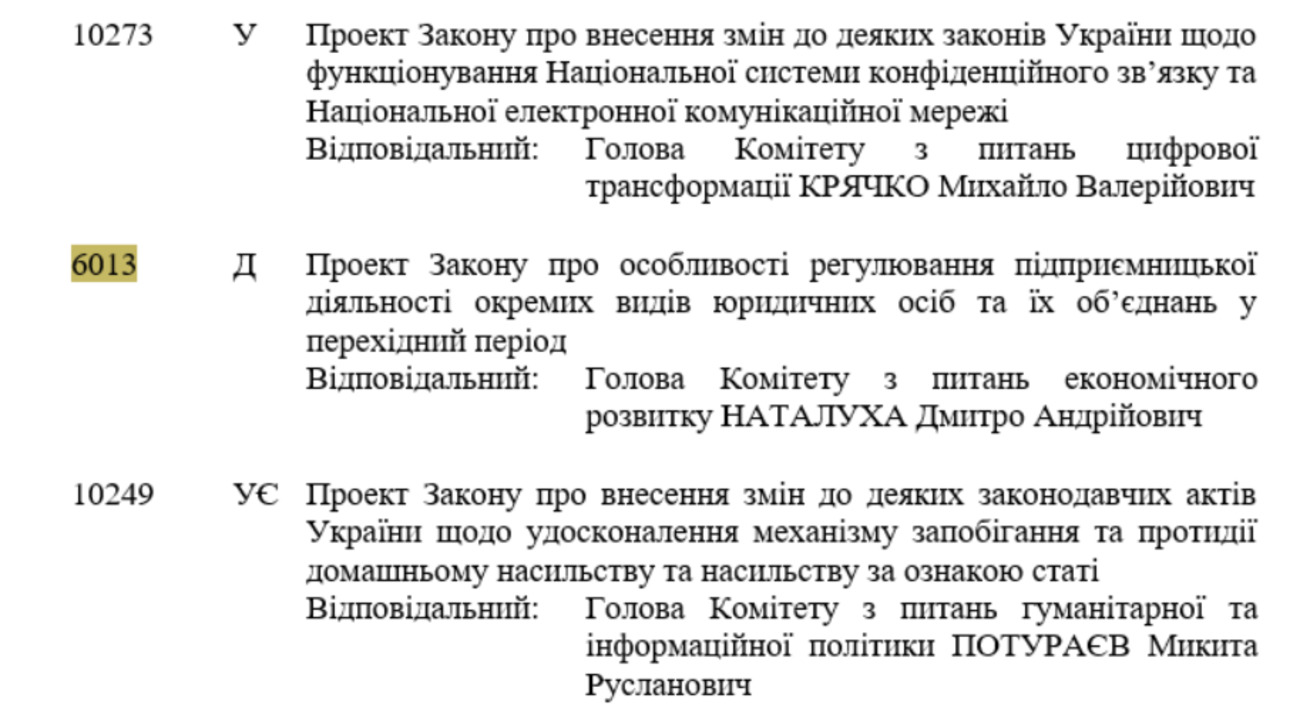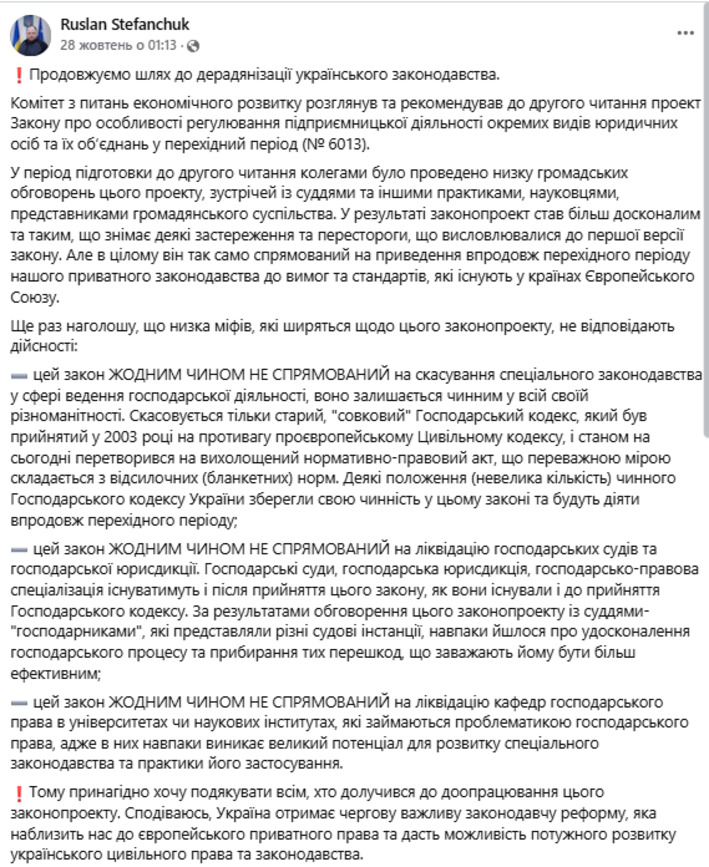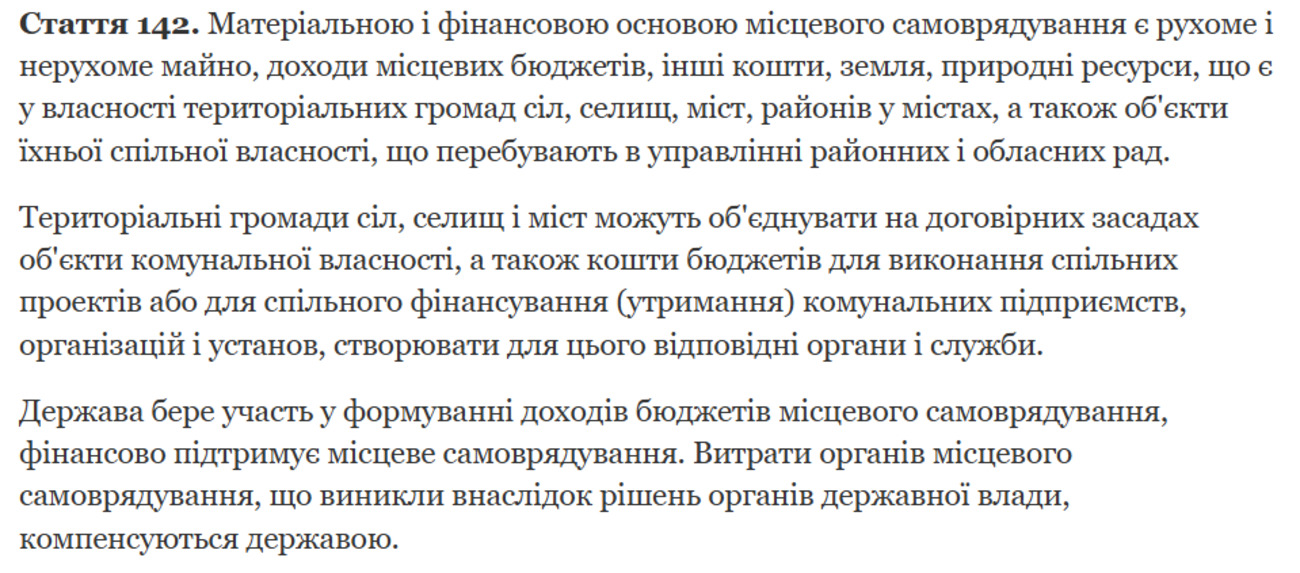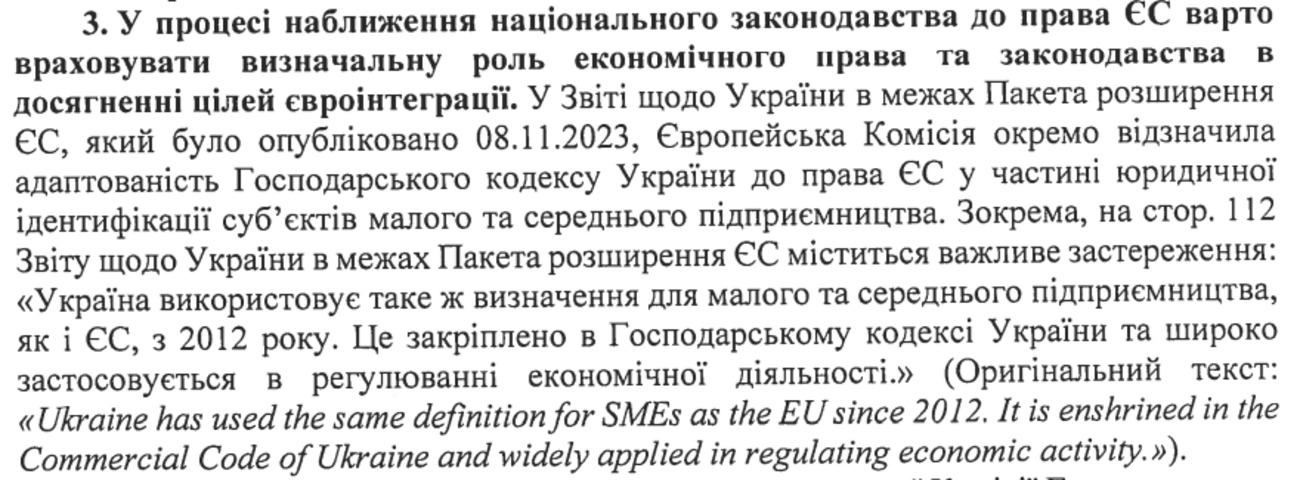Reform of the legal entity system or large-scale redistribution of the country? What is in the making in the Verkhovna Rada

Large-scale redistribution of the country named after Ruslan Stefanchuk
On November 19, during the Verkhovna Rada session, MPs were to consider a draft law by the Speaker of the Verkhovna Rada Ruslan Stefanchuk (6013). This draft law allows all state and municipal enterprises to be transferred to private hands without any privatization. If the parliament passes this law, the property of the state and communities will be under the control of limited liability companies. This will be good for the salaries of «successful managers». However, neither the state nor the communities will be able to influence who uses such property and how. In fact, there is a veiled withdrawal of the state from the management of state property.
Rules may come into effect that, in the absence of any restrictions, will allow for the largest redistribution of public property since Ukraine’s independence without privatization.
This threatens national security, as there will be no enterprises that cannot be privatized. The Verkhovna Rada failed to do its job and did not approve the list of enterprises that are not subject to privatization. This is its constitutional duty. As for the Constitutional Court, after five years of consideration of the case, it withdrew itself from the matter. We wrote about this earlier.
An attempt to hold this project a few weeks ago failed. Before the parliamentary session, various organizations emphasized the risks of the draft law. These include the Association of Ukrainian Cities and judges of commercial courts. Some scholars and the head of the Economic Court of Cassation, Larysa Rohach, also opposed the draft law. Farmers also see risks in the legislative initiative and oppose it.
Stefanchuk was quick to refute the «myths» of his opponents. The bill was withdrawn from consideration at the last minute. A few weeks later, draft law 6013 reappeared on the agenda. This time, it was not without manipulation. However, late in the evening, on November 18, before the session, they managed to remove the draft law from the agenda because they could not collect votes for it. MPs from several factions, including the Servants of the People and the EU, told Holka.
However, given that Stefanchuk is the most likely to mobilize votes for his initiative and the issue may suddenly reappear on the agenda, it is important to analyze what risks experts see in it.
Following a wave of memes about the «firewood law» and bringing citizens to justice, some MPs opposed the wartime turbo mode. Previously, the agenda could be sent to MPs almost before the meeting. This time, they received it almost in record time – 10 days before the meeting. There was a note that draft law 6013 was part of the Ukraine Facility.
Ukraine Facility Plan is a program of financial support for Ukraine from international partners. MP and member of the Batkivshchyna faction Serhiy Vlasenko comments on this as follows:
«This way, colleagues in the session hall can perceive this project as important for our European integration. It should be emphasized here that it has never been positioned in this context before. We stopped an attempt to add the draft law to the agenda in late October. By the way, last time, they failed because we said that we would consider all the amendments. Secondly, if someone included it in the Facility Plan, when would the question arise? And such an inclusion looks dubious and corrupt. We cannot say that this is bringing our legislation in line with the European model. Because EU countries have a number of codes that regulate commercial sector issues in different ways. There is no single standard. The history of this draft law has nothing to do with EU membership».
Later, another version of the agenda appeared, where the note on the Facility Plan disappeared. Therefore, MPs should take this into account.
Mr. Stefanchuk himself positions his initiative as a «de-Sovietization» of legislation. However, he kept silent about the fact that such a code did not exist under the Soviet Union.
In his post, the Speaker of the Verkhovna Rada notes that he has held several discussions with various parties, but statements by various organizations and scholars show that the legislative initiative is seriously criticized by various parties.
Before the vote, judges of commercial courts spoke about the negative consequences for the public sector of the economy.
They pointed out that the reorganization of state-owned enterprises into business entities creates a risk that the state will lose control over enterprises whose privatization is prohibited. This can have negative consequences, including for national security and corruption risks of transferring control over such state-owned enterprises in a non-privatization way.
Judges of commercial courts note: «This is especially true of the draft law’s novelties regarding the abolition of the right of economic management and the right of operational management of state-owned property. Amendments to the laws stipulate that military units of the Armed Forces of Ukraine, higher education institutions, facilities of the National Academy of Sciences of Ukraine, the National Bank, state theaters, etc., will be able to acquire ownership or use of property transferred to them. The implementation of the above provisions of the draft law will increase corruption risks and non-privatization alienation of state property and, as a result, reduce revenues from the privatization of state property to the state budget. They also note that, due to the protracted transition period and uncertainty in enforcing this draft law’s novelties, a favorable atmosphere for raider attacks will arise».
Olena Belyanevych, Doctor of Law and Professor, shares the same opinion. She warns that this law can destroy the state and municipal sectors of the economy, as it provides for the forced reorganization of all operating enterprises into business entities. This should be done through mergers or mergers with existing companies.
«This creates a regulatory framework for raider seizures of enterprises using corporate governance tools (through the formation of managed supervisory boards or appointment of a sole or collective executive body, for example, as in Naftogaz of Ukraine)».
The Association of Ukrainian Cities has a similar opinion on the reorganization of enterprises.
The Association notes: «The requirement to reorganize all municipal enterprises into business companies is the privatization of critical infrastructure, which requires transparent legislation and broad public discussion».
They emphasize that this project will stop the work of municipal enterprises, such as hospitals, schools, housing, and communal services.
Therefore, the Association appealed to the heads of parliamentary factions and groups to reject the draft law.
Ivan Slobodianyk, chairman of the All-Ukrainian Congress of Farmers and executive director of the All-Ukrainian Association of Communities, believes that the adoption of the draft law will threaten the existence of farming with its family type of organization and further exacerbate the problem of raiding in the agricultural sector:
«We have a specific form of enterprise organization called «Farm». It is regulated by a separate law and provides for a family-type of management. This initiative does not take into account such norms. The main concern is the forced transformation of farms into limited liability companies. This form of organization carries risks that we already foresee based on our experience in the agricultural sector».
The All-Ukrainian Congress of Farmers cites a scheme in which the owners of an LLC company allegedly «died», and a successful company was taken over by raiders. Such situations would not have arisen with the «farm» form of business, where, by law, only family members can be owners.
Therefore, the need for forced reorganization looks to farmers like an attempt to kill their sector.
In addition, the Association of Ukrainian Cities says that the draft law is unconstitutional because it does not comply with Articles 142 and 143 of the Constitution of Ukraine, as it prohibits territorial communities from forming communal enterprises, pooling budget funds, and creating the necessary services.
The exclusion of the term «enterprise» from the turnover also does not comply with the Constitution, as this term is used in several articles of the Basic Law (Articles 37, 46, 78, 86, 103, 120, 142, 143). Its exclusion will lead to legal uncertainty, which is contrary to the rule of law. Moreover, the government is the administrator of state property, and therefore, the exercise of its powers will be questionable.
The IV Forum of Public Support for Pro-European Legal Reforms also discussed this initiative. They agreed that the project poses risks to Ukraine’s economic legislation in the context of European integration, ensuring the stability of Ukraine’s legal system and the smooth functioning of the economy in wartime.
The forum participants drafted a resolution that was sent to the Parliament and specialized committees.
The authors of the resolution recall that in 2013, the European Commission positively assessed the provisions of the Commercial Code and noted the adaptation of its terminology to the EU norms.
Roman Babiy, a member of the Legal Policy Committee (elected from the Servant of the People party), notes that most EU member states have codified economic legislation, so Ukraine’s path to the EU should also be to improve and deepen codification:
«For example, in 2000, France adopted a new Commercial Code, which systematized about 50 laws, to replace the 1807 Commercial Code. In recent decades, Austria, Estonia, and Latvia have also adopted new commercial and business codes. In Germany, the Commercial Code (Commercial Code) of 1900 is constantly updated and supplemented. The Belgian Commercial Code serves to implement EU legislation in the business sector. Economic legislation is also codified in many other countries: the USA, Japan, South Korea, Turkey, Kazakhstan, etc».
The Code has advantages compared to laws, of which there are several hundred in total for business regulation. The Code introduces principles that should fill in the gaps and eliminate conflicts when there are so many laws. The Civil Code cannot do this because it does not regulate the relationship between business and the state.
It is quite obvious that any destabilization of the legal system in times of war and «reform» of the legal entity system without an economical basis weaken Ukraine’s defense capability.
Oleh Podtserkovnyi, Doctor of Law, Professor, Corresponding Member of the National Academy of Legal Sciences of Ukraine, cites the history of the United States during World War II as an example:
«On average, one large factory was bought back into state ownership per week. The need to maintain employment in industries that private owners were not able to provide during the war was one of the main factors of the relevant economic policy, not to mention the growing needs of the war economy, which, in the context of planning large-scale defense investments, are most predictably met by the public sector».
In view of this experience, the government’s current plans to carry out a global reformatting of state-owned and municipal enterprises raise questions about the government’s intentions to ensure that the state can sustainably perform its economic and social functions during the war.
At the beginning of the year, the Ministry of Justice emphasized the need to nationalize enterprises such as Motor Sich.
The Department of Civil Law of the National Academy of Legal Sciences of Ukraine emphasizes that this project gradually brings the legal regulation of business relations closer to EU rules and recommendations and brings business activities in line with European standards. Therefore, it sent an appeal to the Parliament in support of the project. It should be noted here that the author of the draft law, Stefanchuk, has been a full member of the Academy since 2020.
The bill is also supported by Supreme Court judges Olena Kibenko (judge of the Commercial Court of Cassation) and Vasyl Krat (judge of the Civil Court of Cassation). As for Judge Krat, the Holka civic initiative has previously highlighted his position on supporting draft laws that could create a «window of opportunity» for developers and provide them with market-based compensation for the property of communities that have been sold off.
Krat notes that the draft law is unlikely to have a negative impact on judicial practice:
«Does the institutional choice of the country – how legal entities will be organized – affect the development of judicial practice? Obviously, no. This is a civilizational choice of the country».
As for Judge Kibenko, she points out that it is unfair to protect the property of the state in a different way than the property of individuals and legal entities. Therefore, it is logical to regulate the activities of all legal entities equally, regardless of their owners. It adds that nowadays, state-owned and private enterprises are so close to business companies in all respects that there is no need to distinguish between them. For example, the name of a joint-stock company can simply be added to the name of a state-owned company.
Kibenko also drew attention to the ruling of the Grand Chamber of the Supreme Court, which concluded that there is no such organizational form of a legal entity as a private enterprise, but a private enterprise is a business company. However, the Grand Chamber’s ruling did not refer to state-owned and municipal enterprises, which the draft law aims to reformat. Instead, the Grand Chamber spoke out against the sale of NJSC Nadra Ukrayiny in parts, as is currently being done with Ukrposhta.
The main author of the initiative, Stefanchuk, noted back in 2021 that «draft law 6013 is a mechanism that will help to properly and painlessly restore order in the field of entrepreneurship, unify the organizational and legal forms of legal entities, introduce civilized legal regimes for property, abandoning Soviet anachronisms such as «full economic management» and «operational management» that do not exist in the civilized world, and offering instead a civilized system of property rights».
Now, the speaker claims that this is the way to «de-Sovietize Ukrainian legislation», abolishing only the «old Soviet economic code». However, this does not affect special legislation in the field of economic activity and does not eliminate economic courts or economic departments at universities.
The Chairman of the Verkhovna Rada did not mention other«myths» such as harm to national security, the actual circumvention of the privatization regime, or the disposal of property from state ownership. He simply quoted his post from three years ago almost in full.
Thus, the risks for the state of losing enterprises on which national security depends remain if the draft law is adopted. In fact, everything is being transformed into companies, and the very concept of privatization is being eliminated.
State-owned enterprises that become companies will become owners and managers of property. This is where one of the biggest corruption risks will arise: when the property of state-owned enterprises, such as the property of Ukrposhta, is simply sold off, and the resources are used to pay salaries to «successful managers».
Therefore, the problems that the state is currently facing, for example, in the national joint-stock company Nadra Ukrainy in the joint-stock company Ukrposhta, which corporate managers are trying to sell in parts, will later be faced by thousands of state and municipal enterprises.
This text is in Ukrainian
Melnyk Yurii, specially for Glavcom.ua




















Коментарі — 0